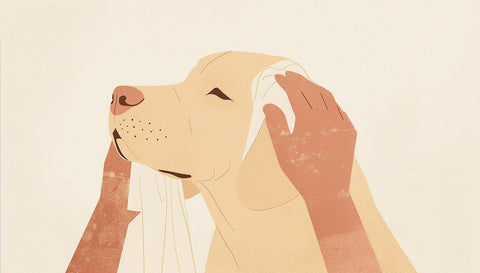Is your dog scratching excessively? It's natural to worry, and most of us quickly assume “fleas!”. But hold on, there are many reasons why your dog might be itching like crazy, and fleas are just one possibility.
From allergies to infections, many things can make your pet feel itchy. Fortunately, most of these issues can be effectively addressed with the appropriate treatment. However, scheduling a visit to the vet is essential to figure out what's causing the scratching.
So, if fleas aren't the problem, what else could it be? Let's find out together and look at why your dog might be itching (apart from fleas).
Why Do Dogs Itch?
Fleas:

Of course, fleas are still a top suspect, especially if you see them hopping around. But even if you don't see any fleas, keep your eyes open for signs of reddish patches, bald spots, or black specks on your dog's fur. These could be signs of a flea infestation. If you notice these signs, or even pale gums (a sign of blood loss), consider using Pure and Natural Pet’s Organic Flea & Tick Spray, a 100% organic and natural solution safe for your pet, family, and furniture. The spray is crafted with lavender, cedar, and peppermint essential oils, which naturally repel fleas and ticks.
Remember, fleas are quick movers and expert hiders, especially in dense or dark fur, making them difficult to spot. Adult fleas make up only 5% of the population, while the majority exist as eggs, larvae, and pupae in the environment. Since a single flea can lay 40-50 eggs daily, even a small number of adults can lead to a big problem. Therefore, not finding a flea doesn't guarantee an absence of fleas.
Allergy Alert:

Some dogs might be allergic to pollen, dust, or pet dander. They can pick up these allergens when they play outside, go for walks, or even just be around other pets at home.
For some dogs, these allergies can cause mild itching, while others may scratch a lot. If you think your dog has an allergy, it's important to figure out what's causing it.
Also, some dogs can get skin problems from food allergies. They might get rashes, infections, or hives if they're allergic to something in their food. Your vet can figure out if your dog's itching is because of a food allergy.
If it is, you might need to change your dog's food and try different options until you find one that works. Switching to a high-quality food without the ingredient your dog's allergic to can solve the problem without needing any medicine.
Suspect seasonal allergies, especially during spring? Our previous blog post, Help Your Dog Deal with Spring Allergies offers tips to identify the cause of the itch and keep your pooch comfortable. You'll find advice on identifying allergy triggers, reducing allergens in your home, soothing bathtime routines, and managing allergies year-round. If you haven't had the chance to read the blog yet, now's the perfect time.
Parasites:
If your dog is scratching but doesn’t have fleas, another type of parasite like skin mites could be the cause. Your dog can pick these up from infected dogs or simply by being outdoors with a weakened immune system. Getting rid of parasites isn't simple, but with a prescribed treatment plan, you can eliminate them. It's important to remember that parasites also include infections like ringworm, which can spread to humans. Dog parasites may be internal, external, or intestinal.
Bacterial Infections:

While it could be something simple, bacterial infections are a possibility. These infections can sometimes look like other skin problems, so seeing a vet for a proper diagnosis is essential.
Bacterial infections can arise from various situations. Maybe your dog got a cut while playing, or perhaps they came into contact with bacteria from another animal. Regardless of the cause, you need to bring your dog to the vet as soon as possible because bacterial infections can worsen rapidly, much like they can in humans, and scratching at an infected wound can also make things much worse.
Yeast Infections:

Dogs often develop skin infections caused by a fungus called Malassezia. Although other types of yeast fungi can also lead to these infections, Malassezia is the most prevalent. Chronic yeast infections can result in dark patches of thickened skin, while even non-chronic cases can be challenging to treat. It's important to take your dog to the vet promptly as the itching caused by these infections can be highly detrimental to their skin.
Consequences of Constant Scratching in Dogs!

Constant scratching in dogs can have several negative effects, impacting their daily activities and behaviour. Your dog may struggle to find comfort for resting or may become too agitated for play and exercise, ultimately affecting their well-being. Also, excessive scratching can damage your dog’s skin, leading to painful open wounds and sores. Damaged skin also increases the risk of bacterial or fungal infections, resulting in redness, swelling, and further discomfort for your dog.
If your dog persists in scratching the same areas, it may cause significant hair loss, not only altering the appearance of your dog’s coat but also leaving them more susceptible to infections. Additionally, persistent scratching, chewing, and licking can lead to the formation of hot spots—red, irritated, and moist patches of skin that can grow and become extremely painful.
To Prevent Itching and Encourage Healthy Skin

If you want to stop your dog from itching and keep their skin healthy, there are some easy things you can do. Depending on why your dog is itching, they might need regular treatment. But you can also help by keeping things clean. Make sure your dog's bed is washed regularly and smells fresh, and give the carpets and floors a good hoover. It's a good idea to bathe your dog now and then to keep their fur clean and free from dirt and dust, which can help their skin stay healthy too.
You can use natural dog shampoos made for dogs with itchy or sensitive skin. But don't bathe your dog too often, as this can remove the natural oils from their fur and make their skin dry and itchy.
Apart from keeping things clean, it's important to make sure your dog feels happy and relaxed at home to stop them from scratching because of stress. You can do this by avoiding things that bother them, ensuring they get enough exercise, and providing them with eco-friendly toys to play with or training games. And don't forget the cuddles, praise, and natural treats – they always help!
American poet Ogden Nash once remarked, “Happiness is having a scratch for every itch” But for your dog, true happiness lies in finding relief from every itch.


